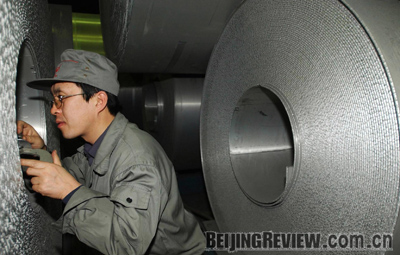|

ROUND WE GO: A worker inspects an aluminum coil at Fushun Aluminum Co. Ltd.
in Liaoning Province. Many aluminum plants have reduced their production
over the last few months to try to stabilize falling mineral resource prices
Faced with continuous price drops of mineral resources such as lead, zinc, copper and aluminum, Chinese companies that sell rare earth minerals have cut their production to try to stabilize prices. But based on the current situation, this measure has not produced the expected effect, because mineral resource prices have continued to fall in China.
Inner Mongolia Baotou Steel Rare-Earth Hi-Tech Co. Ltd. (BSREHT) was the first company that cut its production to stabilize mineral resource prices. It announced on May 29 that it would stop supplying rare earth concentrate and producing rare earth separating products for one month. This would reduce the supply of rare earth on the market by 1,400 tons, accounting for nearly 14 percent of the company’s total output in 2007, the company said.
The company produced about 10,000 tons of rare earth in 2007. According to figures released by the China Nonferrous Metals Industry Association (CNMIA), China produces 96 percent of the world’s total rare earth, while BSREHT accounts for 60 percent of the country’s rare earth output.
After BSREHT said it was cutting its production, 20 mainstay companies of electrolyse aluminum also passed a joint proposal on July 10 in Yantai, Shandong Province, to cut their production by 5-10 percent for one month.
Two days later, 27 lead and zinc smelting companies reached a consensus in Shanghai and decided to cut their output of both lead and zinc by 10 percent from July to September. On August 2, China’s nine large-scale copper smelting companies said they would jointly cut their production by 10-15 percent in the second half of the year.
Besides companies in the nonferrous metal industry, firms that produce iron ore, coal and petroleum also are considering cutting their production to try to stabilize mineral resource prices. Some economists believe that resource companies could continue cutting their production to the end of 2009 or even to 2010.
Stabilizing prices
In its May 29 announcement, BSREHT said the current market prices of neodymium oxide and praseodymium oxide, two rare earth varieties, were falling, and that it would cut its production of them to protect the overall long-term interests of the rare earth industry.
According to figures from China Rare Earth Information Net, the price of praseodymium oxide was 200,000 yuan ($29,326) per ton in May 2007, but fell to 150,000 yuan ($21,944) per ton in May 2008. The price of neodymium oxide fell from 180,000 yuan ($26,393) per ton at the beginning of this year to 170,000 yuan ($24,927) per ton in May.
| 